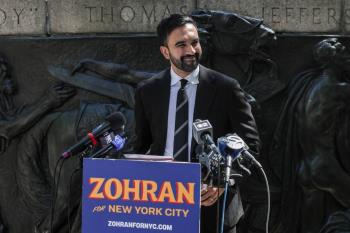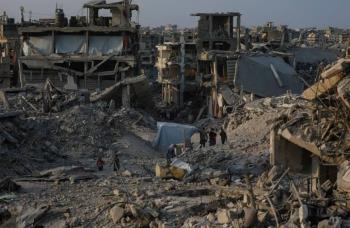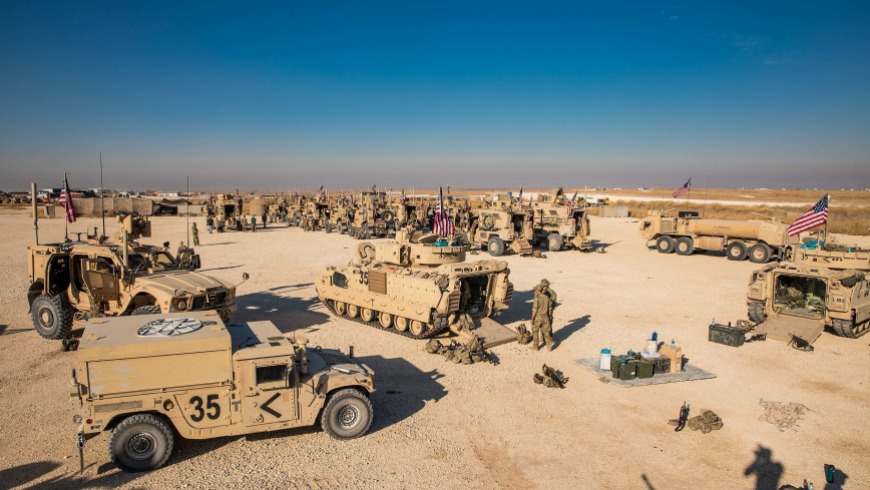Alwaght- While the US President Donald Trump in his first presidential term several times stressed the need to withdraw the US forces from Syria, the rise to power of the militant groups has totally shifted Washington's policies. Now not only the exit plan is put off the agenda, but also the Americans are showing signs of willingness to expand their military presence on Syrian soil.
Informed sources have told Reuters that Washington is preparing to establish a military presence at a key airbase in Damascus. According to the sources, the base in question sits at the gateway to areas slated to become a "de-escalation zone" under a US-brokered non-aggression pact between Syria and Israel.
A Syrian defense official confirmed that the US C-130 transport aircraft have already conducted flights to the site to assess the condition of the runway. While a US official requested the base's name and location be withheld for operational security, other unofficial sources indicate the strategic Al-Mazzah area in Damascus as the likely location.
This new American plan mirrors ongoing ceasefire monitoring missions the US conducts in Lebanon and Israel. The previously unreported initiative to position forces in the Syrian capital signals a strategic review of Damascus about the relations with the US after collapse of Bashar al-Assad later last year.
Trying to keep agreement undercover
The new Syrian government led by Ahmad al-Sharaa, better known for his nom de guerre Abu Mohammad al-Jolani, has tried to keep the public in the dark about the American base in Syria in a bid to paint his government independent and deny dependence on the foreign powers. One of the foreign ministry officials has formally dismissed the news reports, saying that new Syria will keep boosting international cooperation based on the principle of national sovereignty and mutual respect.
However, two Syrian military sources did not deny the core of the story, confirming that the talks have so far focused on technical issues such as logistical use, surveillance, refueling, and conducting humanitarian operations. They emphasized that Damascus would retain full control and sovereignty over the facilities.
Despite these assurances, the Syrian government appears to have tacitly approved the establishment of the US base, downplaying the full scope of the agreement to avoid inflaming ethnic and nationalist sentiments.
The news breaks as the US president is set to meet with al-Joulani at the White House on Monday. This visit, the first official trip by a Syrian head of state to the US since the start of the civil war, is widely reported to focus on lifting economic sanctions and plans for reconstruction of war-ravaged Syria. Experts now speculate that the military base agreement is also a central, if unstated, agenda item.
Though the establishment of the base is publicly framed as a move to solidify stability in Syria, analysts point to a far more complex set of objectives driving this security agreement.
Preventing clashes between Syria and Israel
Us officials claim that the aim of this military base is to prevent any future tensions between Syria and the Israeli regime. But, many agree, this is a calculated move by the Americans to establish their presence in the most secure and most strategic part of Damascus.
The claim of preventing tensions between Tel Aviv and Damascus only holds water if both parties are on the offensive. However, for the past eleven months, the al-Joulani government has maintained a deathly silence in the face of repeated attacks by the Israeli regime. This passive approach has emboldened Tel Aviv to expand its incursions with greater audacity into sensitive areas, including Quneitra that overlooks the capital. Even direct strikes on the defense ministry headquarters and other security installations have not been met with a serious response from Damascus.
Consequently, the Israeli regime's expansionism in Syrian territory has continued unabated. The American presence in Damascus, in reality, provides a cover for legitimizing this occupation. Under the pretext of conflict prevention, Washington is seeking to cement its own military and political influence in a region of critical importance to Tel Aviv.
Al-Mazzeh's strategic significance
Washington's focus on building a base in the strategic region of Al-Mazzeh is a precise and well-calculated move. Al-Mazzeh neighborhood in West of Damascus is one of the most important and most sensitive regions of the capital in terms of security and strategy. Due to its primary geographical position, this region overlooks the key communication routes including the highways to the International Damascus Airport and the Mediterranean coasts.
Al-Mazzeh is home to many of Syrian security, intelligence, and state institutions. The base's proximity to key military command centers and diplomatic districts doubles its strategic significance. Furthermore, Al-Mazzah's commanding position over the routes to the port of Tartus and the country's western regions gives it a vital role in securing Damascus and controlling military movements around the capital.
Consequently, positioning US forces at Al-Mazzeh represents a major strategic asset for Washington. This location would allow American forces to monitor all Syrian security activities and meticulously track the operations and movements of rival powers, notably Russia.
Push for implementing David's Corridor
The US military presence in Damascus can be seen as part of a broader plan serving David's Corridor of Israeli regime. The plan, aimed at constructing a strategic route from the occupied territories to the northeastern Syria, has been on the Washington-Tel Aviv agenda years ago, and after ouster of al-Assad, it was pursued even more seriously.
David's Corridor is, in essence, an effort to secure direct access for the Israeli regime to energy resources and trade routes, while also establishing a security link between the occupied territories, Jordan, and eastern Syria. In this context, the deployment of U.S. forces in parts of Damascus could act as a facilitator for this plan, as an American military presence would provide a protective umbrella for Israeli interests in Syria.
Beyond cementing Washington's foothold in the region, this move could pave the way for a shift in the geopolitical balance of power in favor of the Israeli regime and its Western allies.
Given the al-Jolani’s government's passive approach to repeated Israeli attacks, public discontent is spreading throughout Syria. A nation weary of ongoing occupation and military aggression may spontaneously rise against the encroaching forces if Israeli advances in southern Syria continue. From the perspective of this policy's architects, the presence of US military forces could thus be a means to suppress such a popular uprising and preempt any acts of resistance. In other words, the stationing of American troops is justified not to create stability in Syria, but to secure the interests and safety of the Israeli regime in the region.
Reducing reliance on Iraq bases
By formalizing its military presence in Syria, the US tries to cut its dependence on Iraq for military presence, as Washington in recent years had to withdraw from some of its positions in Iraq following pressures and threats from resistance groups that argue US is an occupation force and should leave the country. Also, presence in Syria will grant Washington a lever for political and security pressure on Baghdad.
In effect, by establishing a strategic foothold in Syria, the US is attempting to send a clear message to the Iraqi government: that even should bilateral cooperation falter, Washington retains the ability to maintain and even expand its influence in the region.
Furthermore, it is likely that Washington will leverage terrorist groups operating from the Al-Hol Camp in Syria to exert additional pressure, directly threatening Iraq's internal security.
Checking Turkish influence in Syria
The American military presence in Syria can be looked at from a different angle. In recent months, Turkey has tried to capitalize on the unstable Syrian conditions and power gain of the militias. Reports talk about Turkish forces entering to the coastal city of Latakia and conducting surveys and mapping operations in various areas to establish a military base.
Caught in a precarious position, the al-Jolani government, which is grappling with political weakness and security instability, sees an opportunity in the Turkish military presence to consolidate its own authority. However, by moving first to establish its own forces in Damascus, the US is attempting to signal to the Syrian leadership that Washington alone is sufficient to guarantee stability, rendering Turkish involvement unnecessary.
This American approach is fundamentally designed to check the expansion of Ankara's influence in the heart of Damascus. It aligns directly with the interests of the Israeli regime, which views a fortified Turkish presence near the borders of the occupied territories as a direct threat, a concern underscored by Israel's repeated targeting of Turkish logistical positions in Syria over recent months.
However, to maintain its relations with Ankara, Washington will likely give Turkey a broader maneuvering room in northern parts of Syria, especially the Kurdish-majority regions, to gain contentment of this NATO member and steer clear of Turkish reactions to the American and Israeli security moves and projects in Syria.
Setting up a military base in Damascus should be regarded as a new ring in a chain of Israeli occupation's projects aimed at tipping the scales of power in Syria and ensuring the security of Tel Aviv and can set the stage for fresh geopolitical developments in the region.



























